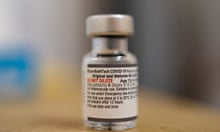The Omicron Covid variant has been found to multiply about 70 times quicker than the original and Delta versions of coronavirus in tissue samples taken from the bronchus, the main tubes from the windpipe to the lungs, in laboratory experiments that could help explain its rapid transmission.
The study, by a team from the University of Hong Kong, also found that the new variant grew 10 times slower in lung tissue, which the authors said could be an indicator of lower disease severity.
Michael Chan Chi-wai, who led the work, said the result needed to be interpreted with caution because severe disease is determined not only by how quickly the virus replicates but also by a person’s immune response and, in particular, whether the immune system goes into overdrive, causing a so-called cytokine storm.
“It is also noted that by infecting many more people, a very infectious virus may cause more severe disease and death even though the virus itself may be less pathogenic,” he said. “Therefore, taken together with our recent studies showing that the Omicron variant can partially escape immunity from vaccines and past infection, the overall threat from the Omicron variant is likely to be very significant.”
Jeremy Kamil, an associate professor of microbiology and immunology at Louisiana State University Health Shreveport, pointed out that Delta, which turned out to be more pathogenic, showed a similar pattern of replicating more slowly in the lungs.
“These authors found Omicron replicates fantastically well – even far better than either Delta or the original virus – in bronchial tissue,” Kamil said. “This could in some ways contribute to an advantage in spread/transmission between people.
“Of course, a huge component of Omicron’s transmissibility in real life is going to be its potential to escape neutralising antibodies that protect against infection in the first place. It’s very likely spreading well even between vaccinated people, especially those who haven’t recently gotten a booster shot.”
The initial data, published online and not yet peer-reviewed, came from experiments using lung tissue samples taken from patients during surgery. By 24 hours, the Omicron variant had replicated about 70 times more than Delta and the original variant. Although the bronchus is not the upper respiratory system, scientists said this could lead to people shedding more virus and passing on infections more easily.
The findings, together with other recent work showing Omicron infects cells more readily, add to an emerging picture that the variant may be intrinsically more transmissible in addition to evading existing immunity.









